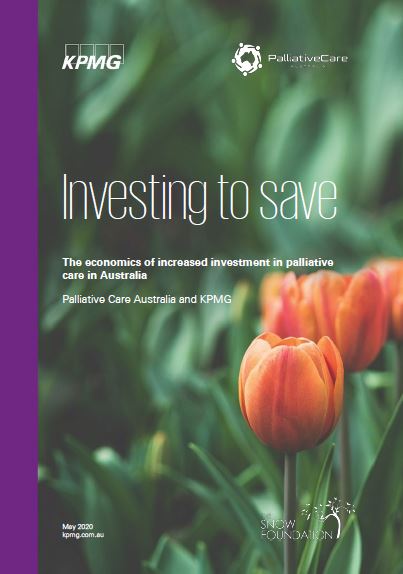Calls For Palliative Care Reform In Post COVID-19 World
Calls For Palliative Care Reform In Post COVID-19 World
Tuesday, May 26, 2020
A new report released today has called for an overhaul of the palliative care system in Australia, calling for an additional annual investment of $365 million to bring the system up to speed in a post COVID-19 world.
The report is also calling for a national agreement on palliative care between the Commonwealth and the states and territories, and a new full-time Palliative Care Commissioner, to help create the best experience possible for those with life-limiting conditions and those around them.
“All Australians who need palliative care are simply not having access to services when they need to, particularly at home and in community settings. As we prepare for an ageing population and other unexpected stresses to our health care system, like COVID-19, we must look seriously at reforming our system to ensure it can meet people’s needs into the future,” Palliative Care Australia Chair Professor Meera Agar said.
“Palliative care is about quality of life, living well with a palliative diagnosis and about dying well. Through an additional annual investment of $365 million on national reform, we can save up to $464 million in other health system costs while making the system work best for those experiencing it. We have to spend money to save money and that’s backed by leading economists.”
The report, commissioned with the assistance of the Snow Foundation by Palliative Care Australia and prepared by KPMG, found that if people can be supported with palliative care outside of institutional settings, they can live well and die in a place of their choosing, for example, at home. In practice however, very few Australians are achieving this.
“There is a distinct lack of knowledge in what services are available and how to access them. There is limited coordination between the states, territories and the Commonwealth to ensure integrated responsive services which can meet demand and a real need to address inadequacies in specialist numbers,” Palliative Care Australia CEO Rohan Greenland said.
The report, released as part of National Palliative Care Week, highlights practical ‘win-win’ opportunities to help address current shortfalls.
Dr Chris Schilling, KPMG Health Economist and report author, said: “Our report shows that increasing the provision of palliative care services not only improves health and social outcomes for people experiencing life-limiting conditions, but also helps to lower end-of-life costs to Government.
“We analysed specialist palliative care being integrated as a ‘core business’ health approach in 3 environments: in aged care facilities, in hospitals and at home.
“Significant savings were made in the first two, while at home the financial outcome was neutral, but in all cases the health outcomes were better. Considerable hospitalisation time – up to 12 days a month – can be prevented by earlier use of palliative care.”
The report was created in partnership with the Snow Foundation, who said they were honoured to help begin a national conversation about addressing Australia’s palliative care needs for the future.
“Many people with a terminal illness want to die in their home, yet only a small percentage do,” Snow Foundation CEO Georgina Byron said.
“We must address current service gaps, meet future significant demand and reduce avoidable costs, including preventable hospitalisations and ICU admissions. This can be achieved by investing in quality palliative care and support to carers through organisations like LifeCircle. This report gives credibility for more robust funding systems to ensure access to high quality palliative care when and where it is needed.”
The report can be downloaded at: https://palliativecare.org.au/kpmg-palliativecare-economic-report
Download PDF of Media Release: Calls for palliative care reform in post COVID-19 world - 26 May 2020

